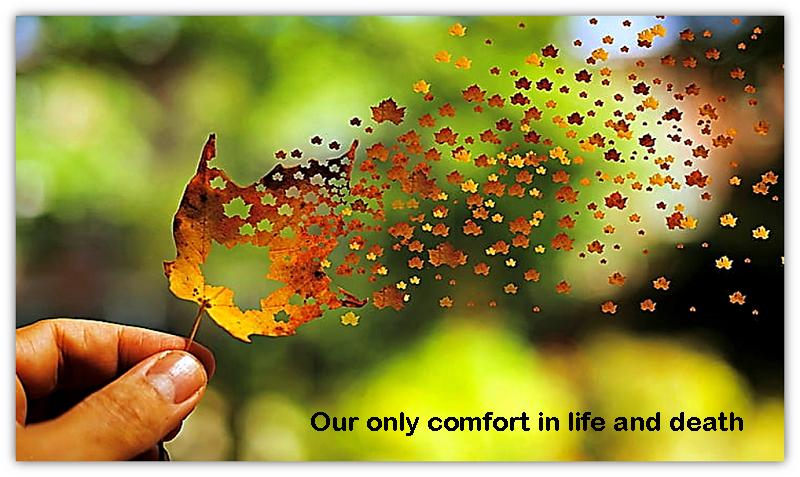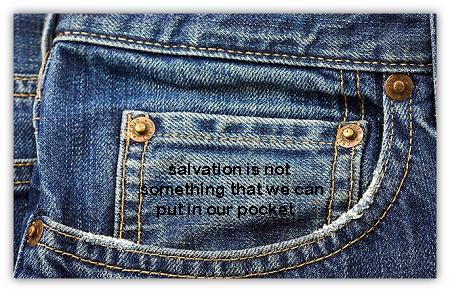Spirituality in the Heidelberg Catechism
Spirituality in the Heidelberg Catechism

Choosing a suitable angle of approach for the theme ‘Spirituality in the Heidelberg Catechism’ was no easy task: not because spirituality is hard to find in this catechism, but rather the opposite. The problem is more one of an abundance of spirituality than of the lack thereof. Whoever wishes to address spirituality in the Heidelberg Catechism must address the whole Heidelberg Catechism (henceforth to be referred to as HC in this article).
Undoubtedly, this has to do with the HC’s point of entry, the question of our only comfort in life and death, a most existential question. This existential tone is retained throughout the whole catechism. Whether it is dealing with knowing our sin, the meaning of the facts of salvation, the relationship with the Father, the Son, and the Holy Spirit, the function of the Law or the function of prayer, spirituality comes to the fore in every aspect.
One could even maintain that the spiritual dimension in the HC is one of the distinguishing characteristics of this confession. A comparison with the Geneva Catechism makes it clear that, while it is largely parallel to the HC, the differences are to be found in the existential applications that can be found in the HC.1
Comparing it with the Westminster Larger and Shorter Catechisms, we see that while the English catechisms speak more explicitly of the ordo salutis, the language is less existential.
W. van‘t Spijker calls this spiritual-existential aspect of the HC not just a distinguishing characteristic of this confession, but also the secret of its lasting power of expression.2 It is therefore remarkable that the spirituality of the HC has received so little attention.3 The sources, the history, the people behind the catechism, the influence and theology of the HC have all received abundant attention, but up till now a thematic analysis of the spirituality of the HC has been lacking. Let this be a humble attempt at filling that gap.
A discussion of the spirituality of the HC can be undertaken in different ways. In this article I would like to formulate the core question as follows: What does a Christian experience in, or according to, the HC? What happens in the believer’s soul? To this end I have walked through the HC attempting to map this out. In this way I hope to gain a greater insight into the spirituality of the HC.
It goes without saying that this outline is open to discussion. Some concepts of experience could be categorized differently (Translators note: Due to the difficulty of finding the exact same concepts of experience in the English version of the HC, these concepts have been left out in this outline; only the number of times per category has been retained). The choice of categories, too, is open to criticism. Quantifying these concepts can also be misleading as the use of a word in one context can differ greatly from its use in another. Taking these remarks into account, this schedule can be useful as a starting point for viewing spirituality in the HC. At the very least it proves that spirituality in the HC is very much alive. The number of spiritual moments in this schedule amounts to 135, meaning that a spiritual moment can be identified, on average, in almost every catechism question. There are, however, more reflections to be made.
Where is the Spirituality in the Section on Our Misery?⤒🔗
It is apparent that very few experiential words occur in the chapter on our misery. Moreover, the words found in this chapter were not exactly the clearest examples of what happens in the soul. Does this mean that the misery is not experienced? The whole of the catechism shows that this is clearly not the case. On the contrary, the whole catechism is characterized by deep bass tones of repentance and mortification. Almost at the end of the HC, the Christian speaks of his sins as transgressions (Q. 126). Nevertheless, the total number of words regarding sorrow and remorse are limited. In comparison to the number of words spent on the vivificatio, this is noticeable. When dealing with the Ten Commandments, the Law is also continuously presented as a mirror of discovery. Without doubt, the intention is to evoke the experience of mortification, yet this emotion is not named as such.

The Spirituality of Faith←⤒🔗
It appears that there are numerous notions connected to faith. Apparently, we cannot speak of faith in a single manner, for various aspects can be distinguished. Faith is knowing, trusting, accepting, assurance and union with Christ.
|
Category |
Misery |
Redemption |
Gratitude |
|
Faith |
|||
|
source |
1 x |
||
|
knowing |
6 x |
4x |
|
|
trusting |
4x |
3x |
|
|
accepting |
5x |
||
|
comforting |
2x |
10x |
2x |
|
union |
12x |
3x |
|
|
Voluntary/affective |
|||
|
repentance |
1x |
1x |
3x |
|
hatred |
4x |
||
|
love |
2x |
13x |
|
|
joy |
2x |
1x |
|
|
struggle |
2x |
4x |
1x |
|
prayer |
5x |
||
|
Effective |
|||
|
process |
5x |
4x |
|
|
obedient |
1x |
5x |
|
|
fruit |
5x |
10x |
|
|
God’s glory |
3x |
6x |
|
|
Hope |
|||
|
3x |
2x |
||
|
6x (in 11 questions) |
63x (in 73 questions) |
66x (in 43 questions) |
There are 52 references in total to the spirituality of faith in the HC. At the risk of quantifying, this is a sign of the spirituality of faith in the HC, and it illustrates how much the soul is directed towards salvation extra nos. Believers do not find salvation within themselves, but they seek salvation outside themselves.

Believers know of their salvation through the promises. The number of references to knowing is a sign of the central position of spiritual knowledge. Word and Spirit lead us to the knowledge of God’s salvation in Christ, whom believers are called upon to trust and then accept in their hearts.
Because salvation lies outside ourselves, it remains something constantly under attack. It is thoroughly clear that salvation is not something we can master, or put in our pocket. Spiritual life in the HC characterizes itself as a restless possession. Believers are people who are constantly in need of being comforted by the assurance of faith. Thus they hear of Christ and His temptations, and in this way Baptism and The Lord’s Supper function to keep the trust in God’s promises alive. That is why trust and assurance are such important aspects of this catechism.
Although salvation comes from outside ourselves, more is to be said about our sharing in this salvation. We cannot tear Christ away from the Christians as though they were independent of one another. This is made evident in this catechism by the central position of the concept of union with Christ, in faith (unio mystica cum Christo). Christ is not only the object of faith and the source of faith, but the Christian ‘grows into one being’, as it were, with Christ. A Christian not only believes in Christ but he is in Christ. Or to put it another way: he is not only saved by Christ, but is in Christ. In short, the Christian cannot be divided from Christ, while Christ can no less be divided from the believer. We do not receive salvation on an abstract spiritual bank account, but spiritual life is very personal: being embodied into the person of Christ. Here the person of Christ receives more attention than in the famous words of Melanchthon that we know Christ if we know his benefits.
The Spirituality of Love←⤒🔗
Subsequently we see that the ground of salvation outside of us is not at the expense of the inside (in nobis) of faith. Through the spiritual unity with Christ, spiritual life is accompanied by inner experience. As categories, I have made use of the terms voluntary and affective. The first concept is directed towards the operation of the will, the other concept can be recognized as an indication of the deepest feeling. The word emotion is unsuitable, although the literal meaning of this word does poignantly depict that we are driven by these feelings.
In love, the voluntary and affective come together. If joy can be seen as an expression of love, and if remorse and hate can be seen as the ‘other side of the coin’ of love, then there are a total of 27 references to the power of heartfelt love. One could call it the spirituality of love.
This love manifests itself in various forms. A paradoxical form of love is remorse. If there is no love, there is no remorse. Remorse springs from the realization of the goodness of the Other, which then crushes our heart. We realize how good God is to us and how much we grieve Him. We would never have this experience if we did not see the goodness of the Other. If we see God as a tyrant, we ought not to repent of our disobedience, but keep it up. The love towards God becomes apparent in a radical attitude. It brings the Christian who breathes the HC to an intense hatred of everything God hates. The reverse is also true: being directed towards God also brings with it that we love what God loves, such as good works, our own soul, our neighbour, the truth, and that we long to serve God in every way.
It is also beautiful that the HC speaks of the joy in God. While Calvin was reticent about speaking of joy in God, the HC uses the term to characterize the renewal of man. It also shows that this joy in God should not be restricted to one single question but that it permeates the whole of the service to God. It is a service of love that does not bring sorrow.
The Spirituality of the Conflict←⤒🔗
At the same time we see that spirituality is taking place in conflict with the old world. Should we expect the HC to complain of the political situation, religious tensions or persecution in the 16th century, we will be disappointed. Although the historical context has undoubtedly placed its mark on the spirituality of the HC and made the authors aware of the reality of the contradiction between the new in Christ and the old in this history, the essence of the conflict can be found at a deeper level. It does not concern a conflict that is taking place in the centre of an arena so that we can watch from a distance how the drama develops and concludes; rather, it is taking place in our own inner self. The Christian therefore has a harder time than the non-Christian, because the latter is unaware of the powers stacked against him. Whoever wishes to lead a life of comfort should not reach out for Christianity because it is that which submerges us in the most intense conflict imaginable, or rather, beyond our understanding. The Christian life is far from perfect, and living as a Christian, out of grace, is not a guarantee for a successful life. The HC even uses the concept ‘enemies to the death’, in order to point out that our enemies are only satisfied when they achieve our eternal death. It is, once more, an indication that there is a tough conflict in our inner self, and that losing has consequences for eternity.

The wonderful part, though, is that all the powers stacked against us are not able to extinguish the fire of faith and love in our hearts. However small that fire of faith may be, in the spiritual warfare the prayers rise up to God in heaven. The HC speaks of the sighing of prayer, which is on the one hand an indication that the prayer rises up from the depths of our hearts, and, on the other, a symptom of the prayers rising up in the realization that we are helpless. Even this sigh is a sign of Christ’s triumph in which the Christian participates. Think of the rower rowing upstream against powerful currents, yet being able to stay in one place.
The Spirituality of Renewal←⤒🔗
In this intense struggle between the old world and the new world, a process of renewal is taking place. Faith is not a view or an opinion, but a power. Fellowship with Christ is effective in the deepest layers of the human personality. Fellowship with Christ manifests itself both in the old self dying and in the new self rising. This resurrection of the new man manifests itself in self-sacrifice, humility, commitment and obedience.
In this context of self-sacrifice, the mystery of the daily renewal by the Spirit becomes evident. It is remarkable how variedly the HC speaks of the fruit of the Spirit, the fruits of faith and the fruit of repentance. It is able to display the shape of humility, of enduring suffering, of respect for all that is holy, of the fear of the Lord that permeates all, of the blazing zeal for the Lord and his service, as well as of the laying down of sin and grudges against our fellows.
The other facet of this renewal, which blossoms out of self-sacrifice, is the glorification of God. The spirituality of the HC is characterized by a perceptive sense for discerning God’s hand in the smallest things, and honouring Him for it. In this regard, the HC speaks uninhibitedly of honouring and praising God and professing His Name. Although renewal in this life is provisional and broken in character, it is, nevertheless, a portion of eternal life. It therefore calls out for the completion of Christ’s kingdom. The fact that the Christian already feels a small part of that eternal joy in his heart is an indication that the Christian life is seen as the modus of eschatological life, although it is not named as such. Remarkably, in the Christian hope, a concrete depiction of the new earth is lacking. The judgment stands at the centre of this spirituality, and the perspective of being with Him who loved us so outstandingly.

Add new comment